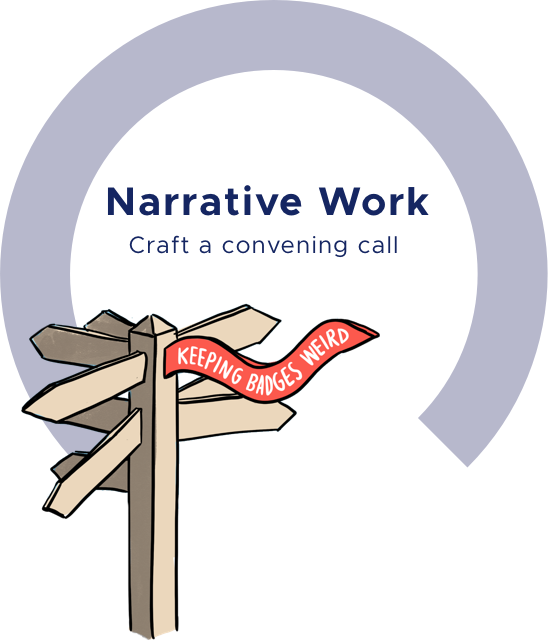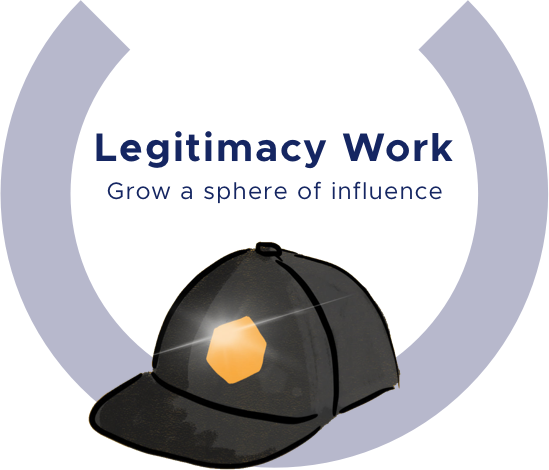How the KBW community is convening systems
cross-posted on We Are Open Co-op blog
First published in 2021 by the Social Learning Lab, Systems Convening: A crucial form of leadership for the 21st century by Etienne and Beverly Wenger-Trayner is an “evolution of [their] work on social learning theory and practice.”
The Keep Badges Weird (KBW) community is filled with what Wenger-Trayner call “system conveners”.

“A [system conveners] stance is both visionary and pragmatic. They look at the social landscape in which they operate — an organization, a city, a community, a country, the world — and they see unrealized potential that exists across traditional boundaries and silos. Many challenges today require learning that brings people together across different practices, different institutions, different goals, different cultures, different loyalties. Systems conveners seek to enable the conversations and learning across these boundaries that are needed to make a difference.”
Systems Convening lays out 7 types of work that go into transitioning from the first loop to the second loop. This post highlights how KBW members are doing this work for learners around the world.
1) Narrative work: crafting a convening call

KBW helps people understand the badge landscape. The community is there to provide solidarity for badge champions and newbies. We do not assume prior knowledge of Open Badges or Verifiable Credentials. We recognise and celebrate those who can share their experience. Anyone interested in badges or integrating Open Recognition are welcome to join.
2) Legitimacy work: Grow a sphere of influence

Badge champions started the community as a response to a disappearing communal spaces for people working on badges. This community includes the people who developed the concept of alternative, digital credentials. We designed and built tools, frameworks and experiments that have pushed technology over the last decade. The connective tissue of Keep Badges Weird is the relationships developed around all things badges. And we’re creating new relationships too.
Through our Code of Conduct and determination to make Keep Badges Weird a big tent for everyone, we provide a welcoming space for people wherever they are on their badge journey.
3) Boundary work: Convene across silos

One of the key boundaries that we have to bridge is one that has always existed in the field of education. It’s a boundary between what education is really about and oppression. We work at this boundary by helping people understand that the bottom line should be about people. This often conflicts with what most bottom lines in our culture actually are (profit). Engaging across silos means closing the gulf between the old system and the new. We need to help the old system decline gracefully. We need to help corporate HR departments, professional development programmes, universities, school administrators and anyone else who creates learning programmes understand how Open Recognition can benefit their learners, as well as their business.
4) Identity work: Support personal transformation

We understand certain things about society, work, culture and education. When we learn social or cultural norms from a young age, we tend not to question them all too much. These norms are just…normal. We often think “this is how it is”. But if anything should be clear at this moment in history, it’s that the norms are changing. We have opportunity to influence what the new normal should mean. In the context of education and accreditation, the new normal should recognise:
“the awareness and appreciation of talents, skills and aspirations in ways that go beyond credentialing. This includes recognising the rights of individuals, communities, and territories to apply their own labels and definitions. Their frameworks may be emergent and/or implicit.”
Participating in the Keep Badges Weird community means rethinking what teaching and learning “have” to look like. From an identity perspective, it is getting comfortable with the part inside you that wants to play, experiment and innovate.
5) Agency work: Cultivate the power to act

The activities in the KBW community run using participatory methodologies and flat hierarchies. Our tools are open and we talk about our work. We invite you, any and everyone, to interact, respond, feedback and contribute. Everyone is welcome. We do our best to model contribution in a way that feels safe for whomever shows up. We commit to helping people feel their own agency, and we hope that people in the community feel celebrated.
6) Power work: Deal with power structures

Many of us in the community have worked inside organisations with established power hierarchies. We break down unhelpful power structures and show how distributed leadership and personal agency has impact. We work with people in power to help them understand the undeniable benefits to sharing power. We acknowledge the social and historical structures that benefit certain kinds of people, while excluding others. We challenge such structures with intentional work towards diversity and inclusion.
7) Narrative work: Articulate the value

Look, pobody is nerfect, and we, like any community of practice, need to get better at articulating the value of Open Recognition. We need to provide resources and guides to help folks understand the power of marking learning journeys in a more holistic way. The difference we’re making is nothing short of democratising how learning is captured, so that anyone can show their knowledge and skills. The potential to create more equity in education and employment is massive.
Get involved
The future of education and employment is learner-centric. How we support people who believe that this is true is up to us. How can we get better at supporting YOU? Join the community and help us!